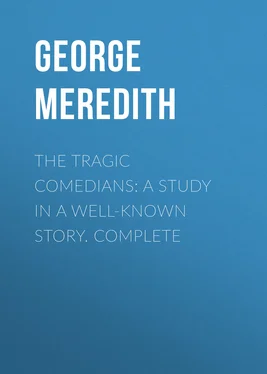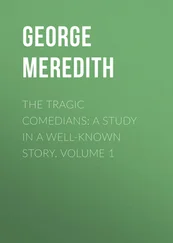George Meredith - The Tragic Comedians - A Study in a Well-known Story. Complete
Здесь есть возможность читать онлайн «George Meredith - The Tragic Comedians - A Study in a Well-known Story. Complete» — ознакомительный отрывок электронной книги совершенно бесплатно, а после прочтения отрывка купить полную версию. В некоторых случаях можно слушать аудио, скачать через торрент в формате fb2 и присутствует краткое содержание. Жанр: foreign_dramaturgy, literature_19, Драматургия, foreign_antique, foreign_prose, на английском языке. Описание произведения, (предисловие) а так же отзывы посетителей доступны на портале библиотеки ЛибКат.
- Название:The Tragic Comedians: A Study in a Well-known Story. Complete
- Автор:
- Жанр:
- Год:неизвестен
- ISBN:нет данных
- Рейтинг книги:4 / 5. Голосов: 1
-
Избранное:Добавить в избранное
- Отзывы:
-
Ваша оценка:
- 80
- 1
- 2
- 3
- 4
- 5
The Tragic Comedians: A Study in a Well-known Story. Complete: краткое содержание, описание и аннотация
Предлагаем к чтению аннотацию, описание, краткое содержание или предисловие (зависит от того, что написал сам автор книги «The Tragic Comedians: A Study in a Well-known Story. Complete»). Если вы не нашли необходимую информацию о книге — напишите в комментариях, мы постараемся отыскать её.
The Tragic Comedians: A Study in a Well-known Story. Complete — читать онлайн ознакомительный отрывок
Ниже представлен текст книги, разбитый по страницам. Система сохранения места последней прочитанной страницы, позволяет с удобством читать онлайн бесплатно книгу «The Tragic Comedians: A Study in a Well-known Story. Complete», без необходимости каждый раз заново искать на чём Вы остановились. Поставьте закладку, и сможете в любой момент перейти на страницу, на которой закончили чтение.
Интервал:
Закладка:
George Meredith
The Tragic Comedians: A Study in a Well-known Story – Complete
The word ‘fantastical’ is accentuated in our tongue to so scornful an utterance that the constant good service it does would make it seem an appointed instrument for reviewers of books of imaginative matter distasteful to those expository pens. Upon examination, claimants to the epithet will be found outside of books and of poets, in many quarters, Nature being one of the prominent, if not the foremost. Wherever she can get to drink her fill of sunlight she pushes forth fantastically. As for that wandering ship of the drunken pilot, the mutinous crew and the angry captain, called Human Nature, ‘fantastical’ fits it no less completely than a continental baby’s skull-cap the stormy infant.
Our sympathies, one may fancy, will be broader, our critical acumen shrewder, if we at once accept the thing as a part of us and worthy of study.
The pair of tragic comedians of whom there will be question pass under this word as under their banner and motto. Their acts are incredible: they drank sunlight and drove their bark in a manner to eclipse historical couples upon our planet. Yet they do belong to history, they breathed the stouter air than fiction’s, the last chapter of them is written in red blood, and the man pouring out that last chapter, was of a mighty nature not unheroical, a man of the active grappling modern brain which wrestles with facts, to keep the world alive, and can create them, to set it spinning.
A Faust-like legend might spring from him: he had a devil. He was the leader of a host, the hope of a party, venerated by his followers, well hated by his enemies, respected by the intellectual chiefs of his time, in the pride of his manhood and his labours when he fell. And why this man should have come to his end through love, and the woman who loved him have laid her hand in the hand of the slayer, is the problem we have to study, nothing inventing, in the spirit and flesh of both. To ask if it was love is useless. Love may be celestial fire before it enters into the systems of mortals. It will then take the character of its place of abode, and we have to look not so much for the pure thing as for the passion. Did it move them, hurry them, animating the giants and gnomes of one, the elves and sprites of the other, and putting animal nature out of its fashionable front rank? The bare railway-line of their story tells of a passion honest enough to entitle it to be related. Nor is there anything invented, because an addition of fictitious incidents could never tell us how she came to do this, he to do that; or how the comic in their natures led by interplay to the tragic issue. They are real creatures, exquisitely fantastical, strangely exposed to the world by a lurid catastrophe, who teach us, that fiction, if it can imagine events and persons more agreeable to the taste it has educated, can read us no such furrowing lesson in life.
BOOK 1
CHAPTER I
An unresisted lady-killer is probably less aware that he roams the pastures in pursuit of a coquette, than is the diligent Arachne that her web is for the devouring lion. At an early age Clotilde von Rudiger was dissatisfied with her conquests, though they were already numerous in her seventeenth year, for she began precociously, having at her dawn a lively fancy, a womanly person, and singular attractions of colour, eyes, and style. She belonged by birth to the small aristocracy of her native land. Nature had disposed her to coquettry, which is a pastime counting among the arts of fence, and often innocent, often serviceable, though sometimes dangerous, in the centres of polished barbarism known as aristocratic societies, where nature is not absent, but on the contrary very extravagant, tropical, by reason of her idle hours for the imbibing of copious draughts of sunlight. The young lady of charming countenance and sprightly manners is too much besought to choose for her choice to be decided; the numbers beseeching prevent her from choosing instantly, after the fashion of holiday schoolboys crowding a buffet of pastry. These are not coquettish, they clutch what is handy: and little so is the starved damsel of the sequestered village, whose one object of the worldly picturesque is the passing curate; her heart is his for a nod. But to be desired ardently of trooping hosts is an incentive to taste to try for yourself. Men (the jury of householders empanelled to deliver verdicts upon the ways of women) can almost understand that. And as it happens, tasting before you have sounded the sense of your taste will frequently mislead by a step or two difficult to retrieve: the young coquette must then be cruel, as necessarily we kick the waters to escape drowning: and she is not in all cases dealing with simple blocks or limp festoons, she comes upon veteran tricksters that have a knowledge of her sex, capable of outfencing her nascent individuality. The more imagination she has, for a source of strength in the future days, the more is she a prey to the enemy in her time of ignorance.
Clotilde’s younger maiden hours and their love episodes are wrapped in the mists Diana considerately drops over her adventurous favourites. She was not under a French mother’s rigid supervision. In France the mother resolves that her daughter shall be guarded from the risks of that unequal rencounter between foolish innocence and the predatory. Vigilant foresight is not so much practised where the world is less accurately comprehended. Young people of Clotilde’s upper world everywhere, and the young women of it especially, are troubled by an idea drawn from what they inhale and guess at in the spirituous life surrounding them, that the servants of the devil are the valiant host, this world’s elect, getting and deserving to get the best it can give in return for a little dashing audacity, a flavour of the Fronde in their conduct; they sin, but they have the world; and then they repent perhaps, but they have had the world. The world is the golden apple. Thirst for it is common during youth: and one would think the French mother worthy of the crown of wisdom if she were not so scrupulously provident in excluding love from the calculations on behalf of her girl.
Say (for Diana’s mists are impenetrable and freeze curiosity) that Clotilde was walking with Count Constantine, the brilliant Tartar trained in Paris, when first she met Prince Marko Romaris, at the Hungarian Baths on the borders of the Styrian highlands. The scene at all events is pretty, and weaves a fable out of a variety of floating threads. A stranger to the Baths, dressed in white and scarlet, sprang from his carriage into a group of musical gypsies round an inn at the arch of the chestnut avenue, after pulling up to listen to them for a while. The music had seized him. He snatched bow and fiddle from one of the ring, and with a few strokes kindled their faces. Then seating himself, on a bench he laid the fiddle on his knee, and pinched the strings and flung up his voice, not ceasing to roll out the spontaneous notes when Clotilde and her cavalier, and other couples of the party, came nigh; for he was on the tide of the song, warm in it, and loved it too well to suffer intruders to break the flow, or to think of them. They were close by when the last of it rattled (it was a popular song of a fiery tribe) to its finish: He rose and saluted Clotilde, smiled and jumped back to his carriage, sending a cry of adieu to the swarthy, lank-locked, leather-hued circle, of which his dark oriental eyes and skin of burnished walnut made him look an offshoot, but one of the celestial branch.
He was in her father’s reception-room when she reached home: he was paying a visit of ceremony on behalf of his family to General von Rudiger; which helped her to remember that he had been expected, and also that his favourite colours were known to be white and scarlet.
Читать дальшеИнтервал:
Закладка:
Похожие книги на «The Tragic Comedians: A Study in a Well-known Story. Complete»
Представляем Вашему вниманию похожие книги на «The Tragic Comedians: A Study in a Well-known Story. Complete» списком для выбора. Мы отобрали схожую по названию и смыслу литературу в надежде предоставить читателям больше вариантов отыскать новые, интересные, ещё непрочитанные произведения.
Обсуждение, отзывы о книге «The Tragic Comedians: A Study in a Well-known Story. Complete» и просто собственные мнения читателей. Оставьте ваши комментарии, напишите, что Вы думаете о произведении, его смысле или главных героях. Укажите что конкретно понравилось, а что нет, и почему Вы так считаете.












